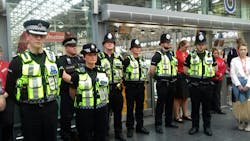Extra BTP Officers Out Across England, Scotland and Wales
In light of recent events, riders will have seen the UK threat level in relation to international terrorism increased to critical overnight. This means that the UK could experience some form of attack imminently.
At British Transport Police, BTP has more officers than usual patrolling at stations as well as on trains across the country. They’re there to make sure riders feel safe and know that they are there to protect you.
Riders may also see some of our armed officers at stations or on trains where you wouldn’t normally expect them to be. Please don’t be alarmed by this, BTP wants to make sure that its officers are covering as much of the rail network as possible.
Whilst there will be more BTP officers at stations across the country and have asked riders to be vigilant, this does not mean that any specific intelligence has been received relating to stations or that there is an increased risk of travelling by train or tube.
However, BTP understand that news about the threat level could be worrying, so the agency urges riders not hesitate to talk to one of BTP's officers if riders are in need any help or advice.
Deputy Chief Constable Adrian Hanstock said: “Our officers have been given specialist training in counter terrorism policing – including behavioural awareness skills. This means that their day-to-day policing role is keenly focussed on keeping passengers and staff as safe as possible.
“Over the coming days, we’ll be keeping a close eye to keep you safe, as well as making sure the nation’s railways keep functioning as usual.
“I want to take this opportunity to remind everyone to stay calm, be vigilant, and if you spot anything at all which gives you cause for concern, let us know. In light of the dreadful events over these last few days, and last night’s increase to the national threat level, nothing should be considered too trivial to report and any information — regardless of whether you feel it is significant or not — may be important to all of us.”
